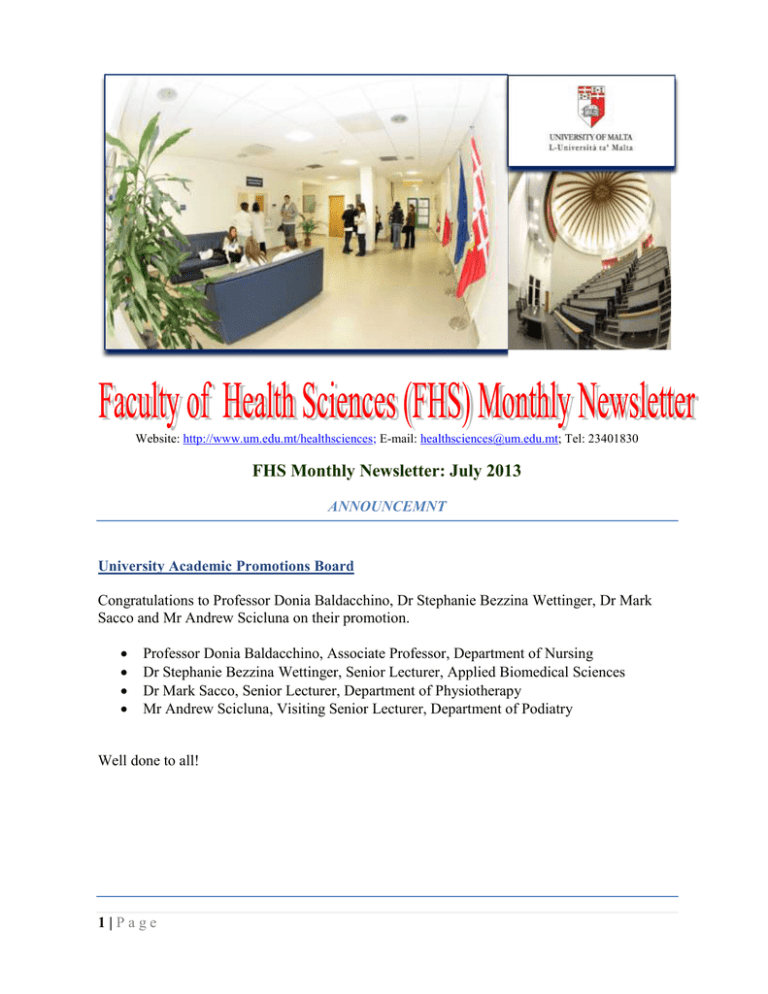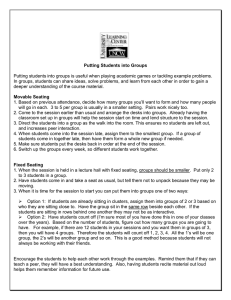FHS Monthly Newsletter: July 2013
advertisement

Website: http://www.um.edu.mt/healthsciences; E-mail: healthsciences@um.edu.mt; Tel: 23401830 FHS Monthly Newsletter: July 2013 ANNOUNCEMNT University Academic Promotions Board Congratulations to Professor Donia Baldacchino, Dr Stephanie Bezzina Wettinger, Dr Mark Sacco and Mr Andrew Scicluna on their promotion. Professor Donia Baldacchino, Associate Professor, Department of Nursing Dr Stephanie Bezzina Wettinger, Senior Lecturer, Applied Biomedical Sciences Dr Mark Sacco, Senior Lecturer, Department of Physiotherapy Mr Andrew Scicluna, Visiting Senior Lecturer, Department of Podiatry Well done to all! 1|Page RESARCH, PUBLICATIONS & PRESENTATIONS Anthony Scerri. Charles Scerri. Caring for persons with dementia: The principles of Person-centred care BOLD (2013) 23 (2); 11-17. Available: http://www.inia.org.mt/data/images/bold/BOLD_FEB_2013.pdf ABSTRACT: Dementia is not a single disease or condition but a syndrome of multiple different aetiologies. It is usually used as an ‘umbrella’ term (Moore, 2009) for more than 200 different conditions and disorders characterized by a progressive deterioration in cognitive function, some of which are considerably rare.. The following review will critically discuss the literature in relation to the development of the principles of person-centred care in dementia. Eventually, studies related to the application of these principles in formal care settings will be critically appraised. Cassar, V; Buttigieg, S.C.; Briner, R.B. (2013). “Causal Explanations of Psychological Contract Breach Characteristics”, The Psychologist-Manager Journal, Vol. 16, No. 2, 85–106. doi: 10.1037/h0094949 Abstract: Cassar and Briner (2005) indicated that psychological contract breach is characterized by at least five characteristics, namely delay, magnitude, type-form, inequity, and reciprocal imbalance. This study investigated the extent to which explanations differed across different characteristics of breach, as well as the relationships of explanations to response reactions. Ninety-four participants supplied 180 episodes of contract breach, together with explanations and reactions. Results showed that explanations (Rousseau, 1995) differed across different breach characteristics. No association was found between explanations and response reaction types. The study highlights specific implications about the management of breach depending on the quality of the breach experience. 2|Page Bartolo P, Mizzi S, Formosa C. 2013. An evaluation of foot care behaviours in individuals with type 2 diabetes living in Malta. Journal of Diabetes Nursing. 17: 73-78 ABSTRACT: Improving how individuals with type 2 diabetes look after their feet is reported to be one of the most effective strategies in minimising diabetic foot complications. This study evaluated foot care behaviour in people with type 2 diabetes living in Malta. Participants were grouped according to age (45–64 years [n=30] and ≥65 years [n=30]); the Nottingham Assessment of Functional Footcare (NAFF; Lincoln et al, 2007) was used to determine foot care behaviours in both groups. There was no significant difference in NAFF scores between the two groups (P=0.635); the mean NAFF score for the group aged 45–64 years was 55.43 and for the group aged ≥65 years was 54.73. Since the possible maximum NAFF score is 87, both groups showed suboptimal foot care behaviour in terms of footwear, hosiery and wound management. Healthcare professionals play an important part in helping individuals with diabetes improve their foot care behaviour and lifestyle to minimise foot complications. Managed Care: Methods/Techniques, Types and Impact Analysis - Cultures for Change (Cynthia Formosa, University of Malta) in Advances in Medicine and Biology. Volume 60. Nova Publishers. ABSTRACT: Managed care is an approach to financing and delivering health care that seeks to control costs whilst ensuring or improve quality of care through a variety of methods. This chapter will explore the role of culture when managing care in any organization. Both patients’ culture and the organizational culture will be explored and discussed in the context of managing care effectively. Culture has important implications for organizations and managers since organizational culture is said to be the personality of the organization (McNamara 2000). The cultural beliefs and values of a population influence the meaning of management and also show up differences in structure of organizations. Every organization is the product of the way its members think and interact. Inside an organization culture are the psychological and social aspects of an organization that influence how people think, what they see as important and how they behave and interact at work (Mannion et al 2005). Culture is clearly an important ingredient of effective organizational performance. The pervasive nature of organizational culture means that if change is to be brought about successfully, then the changes will involve culture. Organizational change can be initiated deliberately by managers, it can evolve slowly within a department, it can be imposed by specific changes in policy or procedures or it can arise through external pressures. Most planned organizational change is triggered by need to respond to new challenges or opportunities presented by the external environment, or in 3|Page anticipation of the need to cope with potential future problems. Change is essential for continued economic performance and competitiveness and new ideas and innovations should not be perceived as threats by any member of the organization (Mullins 2007). Significant organizational change must include not only changing structures and processes but also addressing the current underlying organizational culture (Kimball 2005). In no country is there complete satisfaction with the existing method of delivery of healthcare and there is a continuing search everywhere for healthcare organizations to change and improve (Walshe 2003). Exposing people to alternative ways of understanding their work culture may encourage them to consider changing their current work practice. Mr Martin Ward, Mental Health Nursing, at the University of Southern Indiana, USA In May 2013 Martin Ward was the guest for a week at the University of Southern Indiana, USA, to develop an International Masters programme in community psychiatric nursing. Previously a team from America had visited UoM in June 2012 and the preliminary framework for the programme had been developed during the intervening year. Agreement was reached on all the necessary challenges associated with such a programme and after meeting with the heads of the various departments linked to international studies, including the University President, it was agreed to progress to the next stage of the process, the writing of the draft programme document. This will be undertaken by Martin Ward over the next two months and edited by the international team. It is hoped to open the programme in October 2014 to be taught at the Valletta campus, where UoM will host students from the USA and Europe on what is a unique masters programme in psychiatric and mental health nursing. Shown in the photograph are the team who worked on the project in America. Martin Ward (UoM), Prof. Mayola Rowser, Asst. Dean and Director of Masters of Science programme (USI), Prof. Kathy Reidford, Director of Advanced Practice Psychiatric Nursing studies (USI) Dr Ann White, Dean of the Faculty of Nursing (USI), and Yvonne Beavin, College Administrative Associate (USI) 4|Page NEW RECRUIT Ms Dianne Bonnici Ms Dianne Bonnici has been posted to the Faculty of Health Sciences as a Graduate Trainee and will act as Secretary to the Department of Communication Therapy. Dianne can be contacted on 2340.1835 Room 41; E-mail: dianne.bonnici@um.edu.mt. PAST EVENTS Presentation by Dr Vasilis Valdramidis, Department of Food Studies & Environmental Health, June 2013 Research Seminars 2012/2013 Presentation by Dr Carlo Conti: The influence of trunk-thigh angle on the feasibility of maintaining a neutral lumbar spine during prolonged sitting, 15 May 2013. ABSTRACT: Sitting has become the predominant stance from which most of the Western Civilisation performs its activities. In sitting we commute, dine, work, socialise, study, relax, and carry out many other chores. Yet sitting has been associated with a high incidence of low 5|Page back pain (LBP). In attempting to decrease the prevalence of this ailment a quest for the optimal sitting posture was embarked upon. The trend moved from a sitting posture that favoured flexion of the lumbar spine, to of standing lumbar lordosis, and finally to positioning the lumbar spine in neutral. However, the influence of the lumbo-femoral rhythm was not acknowledged as being influential to the lumbar mechanics of sitting. Thus it is unknown if the neutral spine sitting posture can be maintained during prolonged sitting, and whether the position of the thighs in relation to the trunk bares an influence on this. This study has been carried in part-fulfilment for the Doctor of Clinical Physiotherapy. For this study it was hypothesised that sitting participants will be more able to maintain their lumbar spine in sagittal neutral during prolonged when adopting a trunk-thigh angle of 120⁰ (a.k.a. as half-sitting or active sitting) in contrast to sitting with a trunk-thigh angle of 90⁰ (a.k.a. conventional upright sitting or Victorian sitting). We would like to thank Dr Carlo Cini for his contribution. This was the last Research Seminar for this academic year and the Faculty would like to thank all participants for their interesting presentation, contribution and commitment. Department of Radiography Members of the Department of Radiography have presented the following papers during the European Congress of Radiology held in March 2013. Comparison of radiation dose and image quality between sequential and spiral brain CT presented by Dr Francis Zarb. A review of diagnostic imaging frequency to aid research exploring the issue of consent for higher dose paediatric examinations presented by Dr Paul Bezzina and Mr Jonathan L Portelli. An investigation into the psychological anxiety of Maltese women before and after a mammogram presented by Ms Connie Falzon. A survey of the various methods and techniques employed in myocardial stress testing presented by Dr Paul Bezzina and Ms Karen Borg Grima. Evaluation of image quality optimisation using VGC and ordinal regression analysis presented by Dr Francis Zarb. All the above publications are available from the Department of Radiography. MD Exams 2013 During May and June, the Faculty of Health Sciences Laboratories were used for the fourth time to host the Medical Doctors practical examinations. This event involved not only the use of 14 laboratories pertaining to 6 departments (Midwifery, Nursing, Occupational Therapy, Physiotherapy, Podiatry, Radiography), but also a substantial amount of personnel namely: • 88 medical students; • 85 patients; • 60 examiners. 6|Page The examinations were conducted on a rotation basis where each student had to go from one station to another, each station containing a different scenario. The laboratories were transformed into different configurations to reflect the type of scenario required such as Offices with couch/plinth, Offices with X-Ray viewing boxes, 4 bedded and 8 bedded wards and breakout room and results office. A big thank you goes to Mr Joe Mark Gatt, responsible for this event as well as Mr Malcolm Farrugia (handyman), Mr Alfred Saliba (cleaner), Mr Raymond Degiorgio and Mr Kevin Camilleri (beadles) and Mr Nocolai Schembri (IT) for their contribution. FHS Annual BBQ at Tigne Beach Club, Sliema The end of year BBQ held at Tigne Beach Club on Friday, 19 July, 2013 was once again a huge success. A good number of administrative and academic members of staff attended. Special thanks go to Ms Doris Briffa (Dean`s Office) who organised the BBQ. 7|Page


